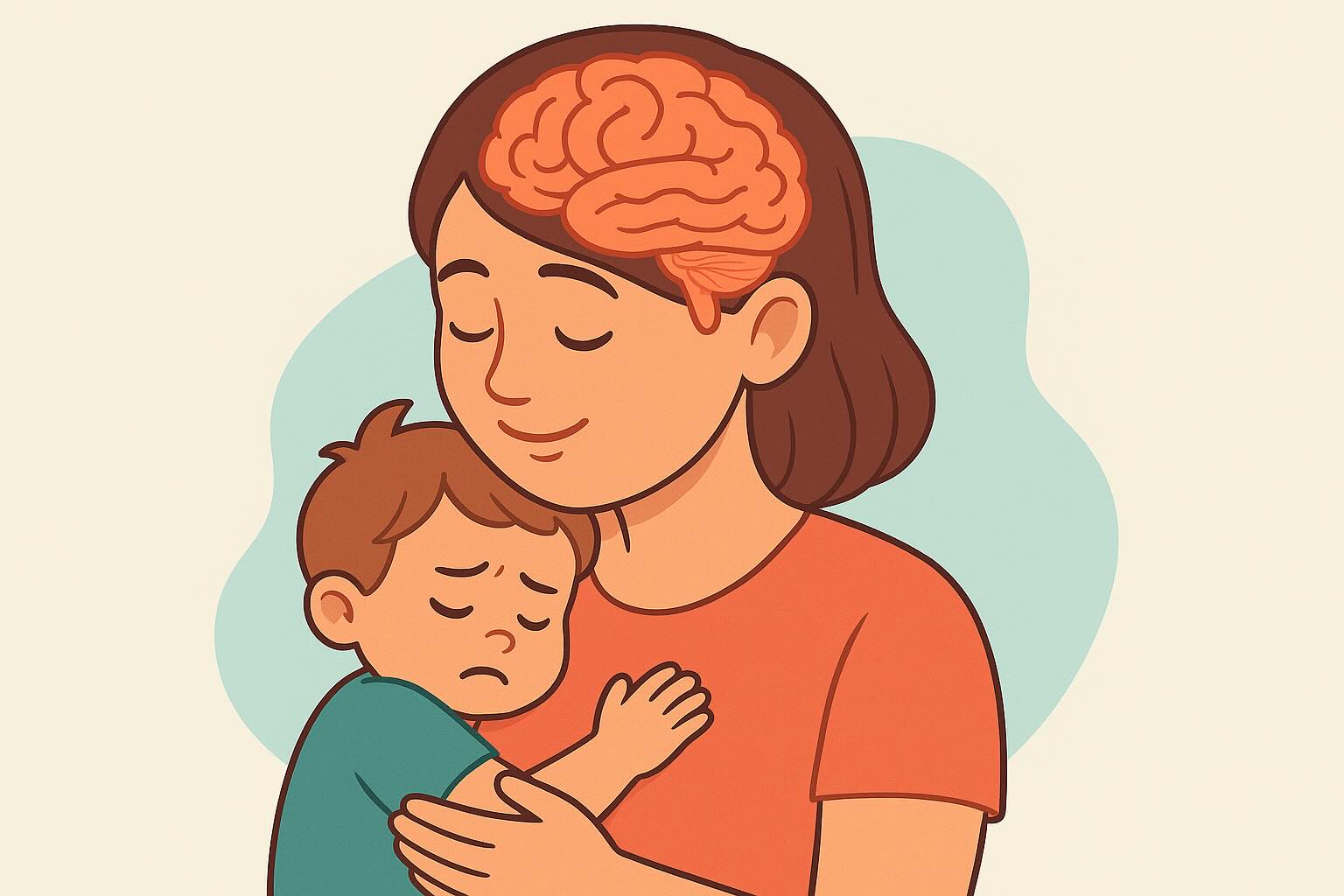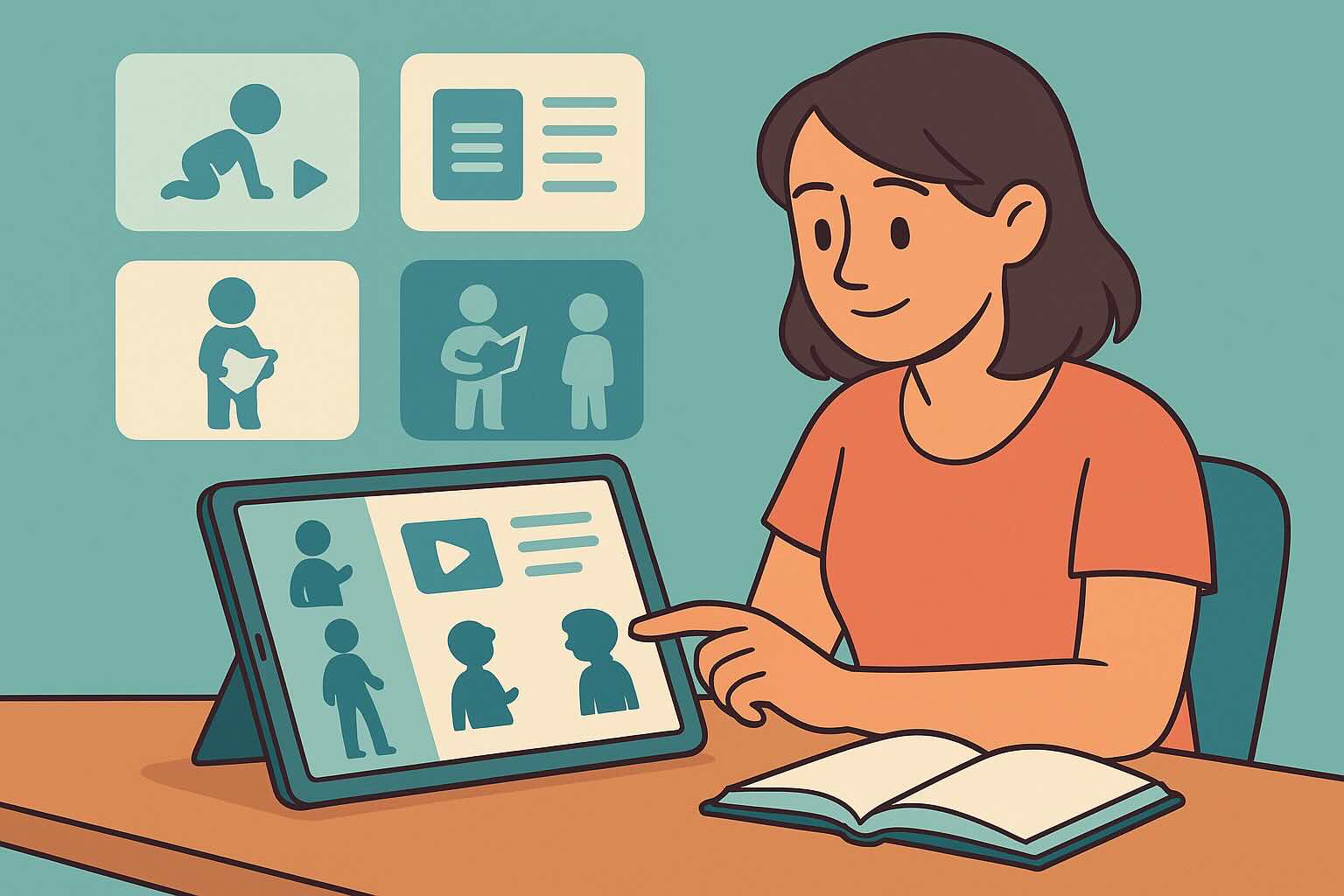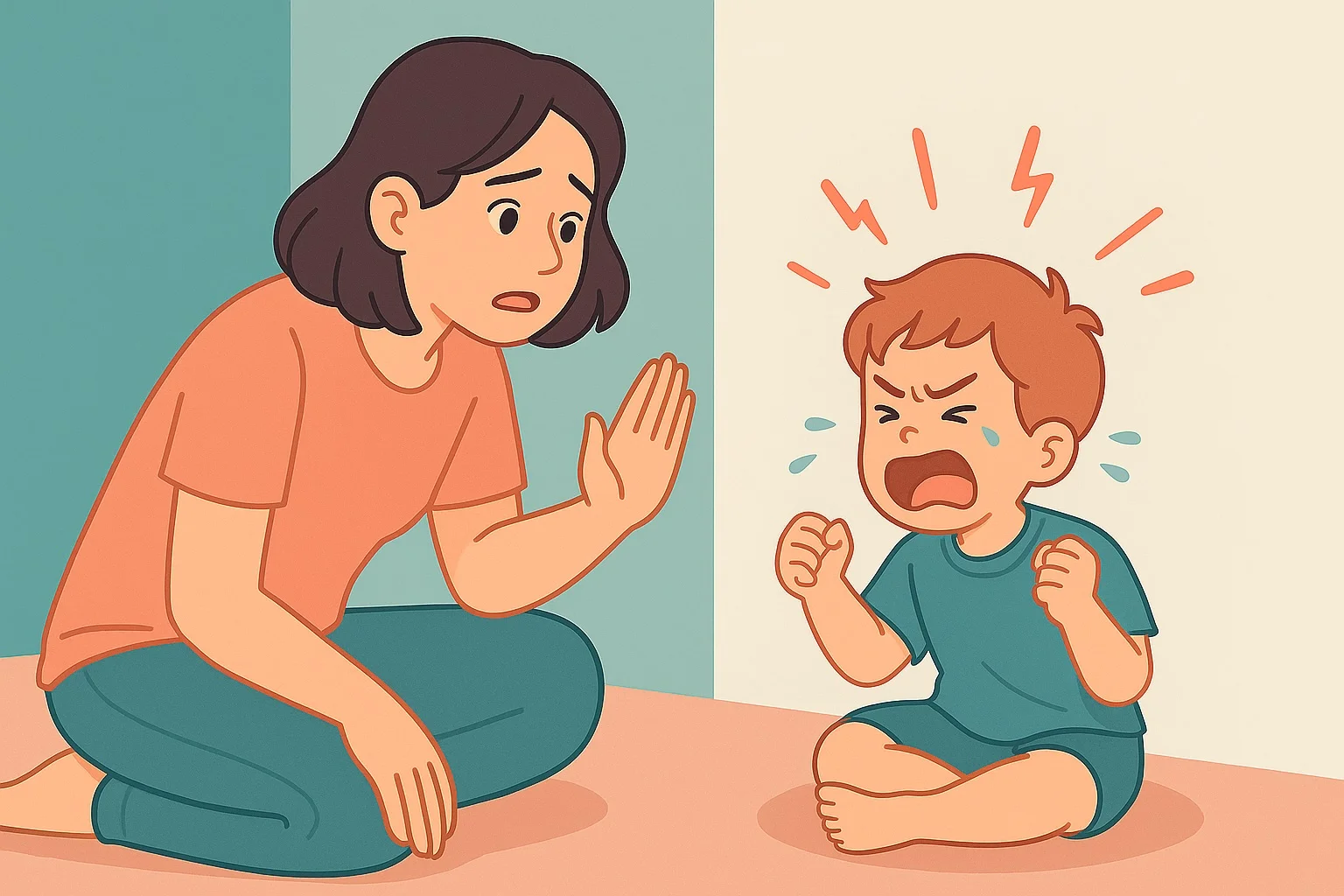How Your Brain Changes When You Become a Parent


If you've been wondering whether "mom brain" is real, feeling overwhelmed by intense emotions, or questioning why you can't think straight since becoming a parent—you're not imagining it. Your brain is literally rewiring itself to help you become the parent your child needs.
When you become a parent, something remarkable happens to your brain. It's not just your life that changes—your neural pathways literally reorganize themselves in one of the most dramatic brain transformations outside of adolescence. This comprehensive guide will help you understand what's happening and how to support your amazing parent brain through this incredible journey.
These brain changes also explain why toddler tantrums feel so intense — your heightened emotional sensitivity is part of the parenting adaptation. This neurological transformation also helps you respond appropriately to childhood anxiety and fears and navigate challenging behavioral moments with greater empathy.
What You'll Learn in This Guide
- The Real Science - Evidence-based insights into structural brain changes during parenthood
- Hormonal Orchestration - How neurochemicals reshape your brain and behavior
- Gender Differences - How mother and father brains adapt differently
- Practical Support - Evidence-based strategies to support your evolving brain (including managing toddler behavior challenges)
- Long-term Benefits - Why these changes are actually advantageous
- When to Seek Help - Red flags that warrant professional support
- Individual Variations - How genetics, culture, and circumstances affect brain changes
Estimated reading time: 10 minutes
How Your Brain Physically Changes When You Become a Parent
Brain Structure Changes: The Most Dramatic Since Adolescence
Dr. Elseline Hoekzema's groundbreaking 2017 study in Nature Neuroscience revealed that becoming a parent triggers the most significant structural brain changes outside of adolescence. This research, now supported by over 1,000 citations and validated through multiple independent studies, shows changes so pronounced that computer algorithms can correctly identify whether a woman has been pregnant with 100% accuracy based solely on brain scans.
Key areas of change:
-
Gray Matter Volume: Research shows selective decreases in gray matter in regions responsible for social cognition, particularly the posterior cortex, temporal poles, and frontal regions. This isn't brain damage—it represents neural pruning, a refinement process that makes the brain more efficient at processing social information relevant to parenting.
-
Prefrontal Cortex: Enhanced activity in areas responsible for empathy, planning, and anxiety monitoring. These changes help parents better anticipate and respond to their child's needs.
-
Limbic System: Increased sensitivity in areas processing emotions and reward, particularly when viewing your own child. This creates the powerful motivation to care for and protect your offspring.
"Mom Brain" and "Dad Brain": What's Really Happening
Many new parents report feeling forgetful or mentally foggy—often called "baby brain" or "mom brain." While this experience is real, research suggests it's not about losing cognitive ability but rather about brain resources being redirected toward parenting-specific skills.
Important note: Recent studies suggest these changes may persist much longer than originally thought—potentially 6+ years postpartum—indicating lasting adaptation rather than temporary disruption.
The Hormones That Rewire Your Parent Brain
The Neurochemical Symphony
Parenting involves a complex interplay of hormones that reshape brain function:
Oxytocin - "The Love Hormone"
- Promotes bonding and attachment through targeted release in specific brain regions
- Increases during physical contact with your baby, creating positive feedback loops
- Enhances pattern recognition for infant cues and emotional states
- Reduces stress response and promotes calm during caregiving activities
- Research shows fathers and mothers both experience oxytocin surges, though timing and triggers may differ
Prolactin - The "Hormone of Paternity"
- Triggers protective behaviors and increases motivation to care for offspring
- Present in both mothers and fathers, with fathers showing 20% increases during partner's pregnancy
- Enhances empathy and reduces testosterone in fathers, promoting nurturing behaviors
- Links to structural brain changes in reward and caregiving circuits
Vasopressin - The Protector
- Increases vigilance and protective behaviors, particularly in fathers
- More prominent in paternal responses but present in both parents
- Linked to pair bonding, family loyalty, and territorial protection
- Balances with oxytocin to create comprehensive caregiving motivation
Dopamine - The Reward System
- Makes caregiving behaviors feel intrinsically rewarding
- Strengthens the desire to repeat nurturing actions through positive reinforcement
- Creates powerful motivation to care for your child even during challenging moments
- Explains why parents often feel joy even during exhausting caregiving tasks
Gender Differences in Parental Brain Changes
Mothers: Pregnancy Primes the Brain
For mothers, brain changes begin during pregnancy and continue evolving postpartum:
- Second trimester: Increased activity in regions associated with empathy and anxiety monitoring
- Third trimester: Enhanced neural responses to infant cries and distress signals
- Postpartum: Continued refinement of caregiving circuits for at least 2 years, potentially longer
- Breastfeeding: Additional neuroplastic changes related to hormone fluctuations and mother-infant bonding
Research shows these changes are so consistent that they appear universal across cultures, suggesting deep evolutionary programming.
Fathers: Experience-Driven Adaptation
Fathers' brains also undergo significant changes, though through different mechanisms:
- Pre-birth: Hormonal changes begin during partner's pregnancy, including cortisol and prolactin increases
- Early parenthood: Rapid development of caregiving neural networks within 12-16 weeks
- Ongoing adaptation: Brain structure continues evolving with hands-on parenting experience
- Experience dependency: Fathers who spend more time in direct caregiving develop brain changes similar to those seen in mothers
Studies show structural changes in hypothalamus, amygdala, and prefrontal regions, with gray matter increases in areas associated with empathy and caregiving motivation.
The Neuroscience of Parental Intuition
Pattern Recognition Superpowers
Your brain becomes incredibly attuned to your specific child's needs through measurable neuroplastic changes:
- Cry Recognition: Parents can identify their own baby's cry within seconds, even among multiple infants, due to enhanced auditory processing in emotional brain regions
- Facial Expression Reading: Improved ability to detect subtle changes in your child's emotional state through enhanced visual processing
- Behavioral Prediction: Increased capacity to anticipate your child's needs before they're explicitly expressed
- Sleep Sensitivity: Enhanced responsiveness to child's nighttime sounds while filtering out irrelevant environmental noise
Default Mode Network Considerations
Note: This represents emerging research requiring caution in interpretation
Some preliminary studies suggest the brain's default mode network—active during rest—may become reorganized around thoughts of your child. While 2022 research shows DMN changes during pregnancy and breastfeeding, comprehensive evidence for parent-specific reorganization is still developing. This explains why parents often find themselves thinking about their children during quiet moments, though more research is needed to fully understand these patterns.
Practical Implications for Parenting
Understanding Your Changing Responses
Heightened Emotional Reactivity
- Your brain is more sensitive to your child's distress signals due to enhanced limbic system activity
- This can feel overwhelming but serves an important biological function for child survival
- Practice self-compassion when emotions feel intense—you're not being "overly sensitive," you're being biologically appropriate
Enhanced Multitasking
- Parent brains develop improved ability to monitor multiple streams of information simultaneously
- You become better at attending to your child while managing other tasks
- This skill develops over time—be patient with yourself during the learning curve (typically 3-6 months)
Sleep Sensitivity
- Brain changes make you more responsive to your child's nighttime needs through altered sleep architecture
- Light sleep patterns serve a protective function for your family
- Understanding this biological basis can reduce frustration about sleep disruption
The "Mom Brain" Reality Check
What's Actually Happening:
- Your brain is reallocating cognitive resources toward parenting-specific skills
- You're not losing intelligence—you're gaining specialized capabilities optimized for caregiving
- Memory "issues" often relate to information prioritization, not cognitive decline
- Your brain is becoming more efficient at pattern recognition for your child's specific needs
- Working memory may temporarily decrease while emotional and social cognition increase
Common Experiences:
- Walking into a room and forgetting why you came (attention divided between child monitoring and tasks)
- Difficulty concentrating on non-parenting tasks (cognitive resources redirected)
- Feeling mentally "foggy" or slower than usual (processing priorities shifted)
- Increased emotional sensitivity to your child's cues (enhanced empathy networks)
Supporting Your Evolving Brain
1. Prioritize Sleep When Possible
- Sleep consolidates the neural changes supporting effective parenting
- Even short naps help brain reorganization and emotional regulation
- Sleep deprivation can interfere with positive neuroplastic adaptations
2. Practice Mindfulness
- Meditation supports healthy brain plasticity and stress management
- Helps integrate emotional and cognitive brain networks
- Reduces overwhelm from heightened sensitivity
3. Maintain Social Connections
- Social support activates oxytocin systems and reduces isolation
- Validates normal parenting experiences and reduces anxiety
- Provides cognitive stimulation beyond child-focused activities
4. Be Patient with the Process
- Major brain changes take 6-12 months to stabilize
- The first year involves rapid neural reorganization that can feel destabilizing
- Individual variation in adaptation timeline is normal and expected
Individual Variations in Brain Changes
Factors Affecting Neural Adaptation
Genetic Factors
- Oxytocin and dopamine receptor variations affect bonding intensity and timeline
- Some parents may experience more dramatic changes than others
- Genetic predisposition influences emotional regulation and stress response
Cultural and Environmental Influences
- Parenting practices and expectations shape neural adaptation patterns
- Social support availability affects stress hormones and neuroplasticity
- Socioeconomic factors influence access to resources supporting brain health
Personal History
- Previous trauma may affect stress response systems during transition
- Prior experience with children influences baseline neural patterns
- Mental health history impacts adaptation process and support needs
Pregnancy and Birth Experiences
- Complications during pregnancy or birth may affect neurohormonal patterns
- Premature birth or NICU experiences influence bonding timeline
- Postpartum depression or anxiety can interfere with normal brain adaptations
The Long-Term Perspective
Lasting Benefits
The brain changes of parenthood offer significant long-term advantages:
- Enhanced Empathy: Measurable improvements in reading others' emotional states persist beyond early parenting years
- Better Stress Management: Once initial adjustment completes, many parents develop superior resilience and emotional regulation
- Increased Cognitive Flexibility: Practice juggling multiple priorities enhances mental agility and problem-solving skills
- Improved Social Cognition: Better ability to understand and predict social behaviors benefits all relationships
Supporting Continued Development
Your parenting brain continues evolving throughout your child's development:
- Toddlerhood: Enhanced executive function to manage challenging behaviors and safety monitoring
- School Age: Improved ability to support learning, navigate social complexities, and balance independence with guidance
- Adolescence: Adaptation to support growing independence while maintaining emotional connection and availability
Research Frontiers and Limitations
Emerging Understanding
Scientists continue uncovering the full scope of parental brain changes:
- Epigenetic factors: How parenting experiences shape gene expression in neural circuits across generations
- Cultural variations: How different parenting styles and cultural expectations influence brain development patterns
- Technology impact: How modern parenting tools and digital environments affect neural adaptation
- Long-term outcomes: Whether parental brain changes persist into grandparenthood and beyond
Important Research Limitations
Study Constraints
- Most research focuses on cisgender, heterosexual couples in Western cultures
- Limited data on adoptive parents, same-sex couples, and single parents
- Varying definitions of "involved fatherhood" across studies affect comparability
- Small sample sizes in some neuroimaging studies limit generalizability
Individual Differences
- Significant variation exists between individuals in timing and extent of changes
- Some parents may not experience typical patterns due to various factors
- Mental health conditions, medications, and medical complications can influence outcomes
Your 30-Day Parent Brain Support Plan
Week 1: Understanding and Acceptance
- Day 1-3: Track your cognitive changes without judgment using a simple journal
- Day 4-7: Practice self-compassion when experiencing "mom brain" moments
- Focus: Normalize the experience and reduce self-criticism about changes
Week 2: Building Support Systems
- Day 8-10: Share your experiences with trusted friends or family members
- Day 11-14: Connect with other parents experiencing similar neurological changes
- Focus: Reduce isolation and build understanding of universal experiences
Week 3: Practical Strategies
- Day 15-18: Implement evidence-based sleep hygiene practices (even 10-minute mindfulness sessions help) and consider how your enhanced brain supports building healthy routines
- Day 19-21: Create simple organizational systems for daily tasks and memory support
- Focus: Support your brain's adaptation process with practical tools
Week 4: Long-term Habits
- Day 22-25: Establish a brief daily mindfulness practice (5-10 minutes)
- Day 26-30: Create realistic expectations for your cognitive performance during this transition
- Focus: Sustainable support for your evolving brain with long-term perspective
Embracing Your Parenting Brain
Understanding the neuroscience of parenting can help normalize the intense experience of becoming a parent. Your brain is literally rewiring itself to help you succeed in one of life's most important and challenging roles. This biological transformation provides the foundation for developing patience and skill in addressing common parenting challenges like helping children through whining behaviors.
Key Insights to Remember
- "Baby brain" represents neural specialization for parenting, not cognitive decline
- Both mothers and fathers experience significant, measurable brain changes
- These changes serve important adaptive functions developed through evolution
- The adaptation process takes 6-12 months and varies significantly between individuals
- Your brain continues evolving throughout parenthood, adapting to developmental stages
- These changes offer long-term cognitive and emotional benefits beyond early parenting
- Support systems and self-compassion accelerate positive adaptation outcomes
- Individual variations are normal and don't reflect parenting quality or capability
When to Seek Professional Support
Red Flags That Warrant Professional Consultation
While parent brain changes are normal, certain symptoms may indicate you need additional support:
- Severe memory problems that interfere with daily safety or basic functioning
- Persistent mood changes lasting more than 2 weeks that interfere with daily life
- Inability to concentrate on critical tasks (driving, work safety, child supervision)
- Overwhelming anxiety about your cognitive changes that interferes with daily functioning
- Thoughts of harming yourself or your baby
- Complete inability to bond with your child after several weeks
- Persistent feelings of detachment from your child beyond initial adjustment
Types of Professional Support Available
Postpartum mental health specialists can help distinguish normal brain changes from postpartum depression, anxiety, or psychosis Neuropsychologists can assess cognitive function if you have significant concerns about memory or thinking Support groups provide normalization, practical strategies, and peer connection Healthcare providers can rule out medical causes (thyroid, vitamin deficiencies) and provide appropriate referrals
Key Takeaways: Your Parent Brain Transformation
- ✅ Brain changes are evolutionarily adaptive and help you become a more effective parent
- ✅ "Mom brain" is neural specialization, not cognitive decline or failure
- ✅ Both parents experience significant changes through different but complementary mechanisms
- ✅ The adaptation process takes 6-12 months - patience with yourself is essential
- ✅ Support systems accelerate positive outcomes - don't struggle through this alone
- ✅ Long-term benefits include enhanced empathy, resilience, and social cognition
- ✅ Professional help is available if changes feel overwhelming or concerning
- ✅ Your brain continues evolving throughout your parenting journey
- ✅ Individual variations are normal and don't reflect your parenting quality
Conclusion
The transformation into a parenting brain represents one of the most remarkable examples of human neuroplasticity. Every sleepless night, every moment of worry, every surge of love—these experiences are literally reshaping your brain to help you become the parent your child needs.
Rather than fighting these changes, embrace them as evidence of your brain's incredible ability to adapt and grow. You're not losing yourself; you're evolving into a new version of yourself, equipped with enhanced capabilities for nurturing and protecting the next generation.
Remember: Your changing brain is not a problem to solve—it's a biological adaptation to understand, support, and celebrate. Your evolved parent brain is particularly well-equipped to support your child's emotional development and implement connection-based approaches to challenging behaviors.
The research in this article is based on peer-reviewed studies published in leading neuroscience journals. While individual experiences may vary, the documented brain changes represent consistent findings across multiple research groups and cultures. For the most current research updates, consult with healthcare providers familiar with parental neuroscience.
Expert Content Library
Access multimedia resources, articles, and expert-reviewed content organized by topics and your child's age.

Free Tantrum Scripts
Help your toddler manage big emotions with these strategies and scripts.
Frequently Asked Questions
Need personalized support?
RootWise's AI coach can provide tailored strategies for your specific situation, available 24/7 when you need it most.
Learn More About AI Coaching →



